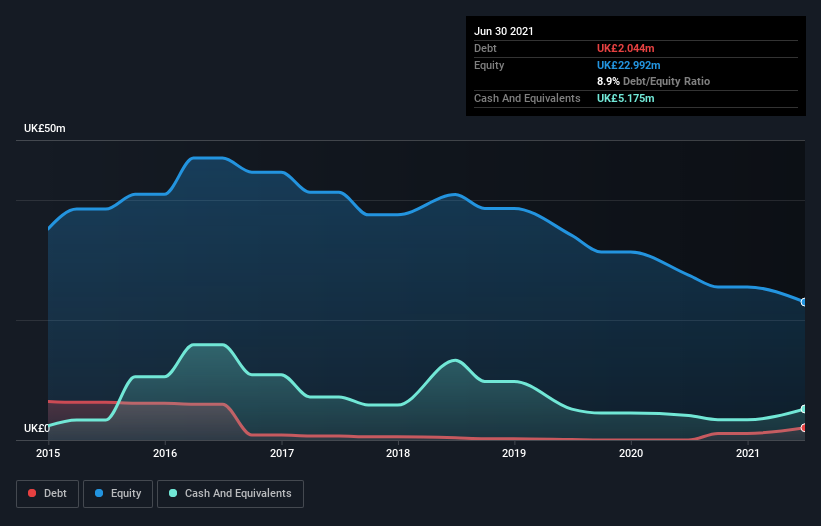The external fund manager backed by Berkshire Hathaway's Charlie Munger, Li Lu, makes no bones about it when he says 'The biggest investment risk is not the volatility of prices, but whether you will suffer a permanent loss of capital.' So it seems the smart money knows that debt - which is usually involved in bankruptcies - is a very important factor, when you assess how risky a company is. Importantly, Plexus Holdings plc (LON:POS) does carry debt. But the more important question is: how much risk is that debt creating?
When Is Debt Dangerous?
Generally speaking, debt only becomes a real problem when a company can't easily pay it off, either by raising capital or with its own cash flow. If things get really bad, the lenders can take control of the business. While that is not too common, we often do see indebted companies permanently diluting shareholders because lenders force them to raise capital at a distressed price. Of course, debt can be an important tool in businesses, particularly capital heavy businesses. The first step when considering a company's debt levels is to consider its cash and debt together.
See our latest analysis for Plexus Holdings
How Much Debt Does Plexus Holdings Carry?
As you can see below, at the end of June 2021, Plexus Holdings had UK£2.04m of debt, up from none a year ago. Click the image for more detail. However, its balance sheet shows it holds UK£5.18m in cash, so it actually has UK£3.13m net cash.

A Look At Plexus Holdings' Liabilities
The latest balance sheet data shows that Plexus Holdings had liabilities of UK£3.00m due within a year, and liabilities of UK£1.09m falling due after that. On the other hand, it had cash of UK£5.18m and UK£1.05m worth of receivables due within a year. So it can boast UK£2.14m more liquid assets than total liabilities.
It's good to see that Plexus Holdings has plenty of liquidity on its balance sheet, suggesting conservative management of liabilities. Due to its strong net asset position, it is not likely to face issues with its lenders. Simply put, the fact that Plexus Holdings has more cash than debt is arguably a good indication that it can manage its debt safely. The balance sheet is clearly the area to focus on when you are analysing debt. But it is Plexus Holdings's earnings that will influence how the balance sheet holds up in the future. So if you're keen to discover more about its earnings, it might be worth checking out this graph of its long term earnings trend.
In the last year Plexus Holdings wasn't profitable at an EBIT level, but managed to grow its revenue by 284%, to UK£2.0m. That's virtually the hole-in-one of revenue growth!
So How Risky Is Plexus Holdings?
By their very nature companies that are losing money are more risky than those with a long history of profitability. And the fact is that over the last twelve months Plexus Holdings lost money at the earnings before interest and tax (EBIT) line. And over the same period it saw negative free cash outflow of UK£3.1m and booked a UK£4.1m accounting loss. However, it has net cash of UK£3.13m, so it has a bit of time before it will need more capital. The good news for shareholders is that Plexus Holdings has dazzling revenue growth, so there's a very good chance it can boost its free cash flow in the years to come. While unprofitable companies can be risky, they can also grow hard and fast in those pre-profit years. There's no doubt that we learn most about debt from the balance sheet. But ultimately, every company can contain risks that exist outside of the balance sheet. For example, we've discovered 3 warning signs for Plexus Holdings that you should be aware of before investing here.
If, after all that, you're more interested in a fast growing company with a rock-solid balance sheet, then check out our list of net cash growth stocks without delay.
New: Manage All Your Stock Portfolios in One Place
We've created the ultimate portfolio companion for stock investors, and it's free.
• Connect an unlimited number of Portfolios and see your total in one currency
• Be alerted to new Warning Signs or Risks via email or mobile
• Track the Fair Value of your stocks
This article by Simply Wall St is general in nature. We provide commentary based on historical data and analyst forecasts only using an unbiased methodology and our articles are not intended to be financial advice. It does not constitute a recommendation to buy or sell any stock, and does not take account of your objectives, or your financial situation. We aim to bring you long-term focused analysis driven by fundamental data. Note that our analysis may not factor in the latest price-sensitive company announcements or qualitative material. Simply Wall St has no position in any stocks mentioned.
Have feedback on this article? Concerned about the content? Get in touch with us directly. Alternatively, email editorial-team (at) simplywallst.com.
About AIM:POS
Plexus Holdings
Provides equipment and services for the oil and gas drilling industry in the United Kingdom, the United States, and internationally.
Reasonable growth potential with mediocre balance sheet.
Market Insights
Community Narratives



